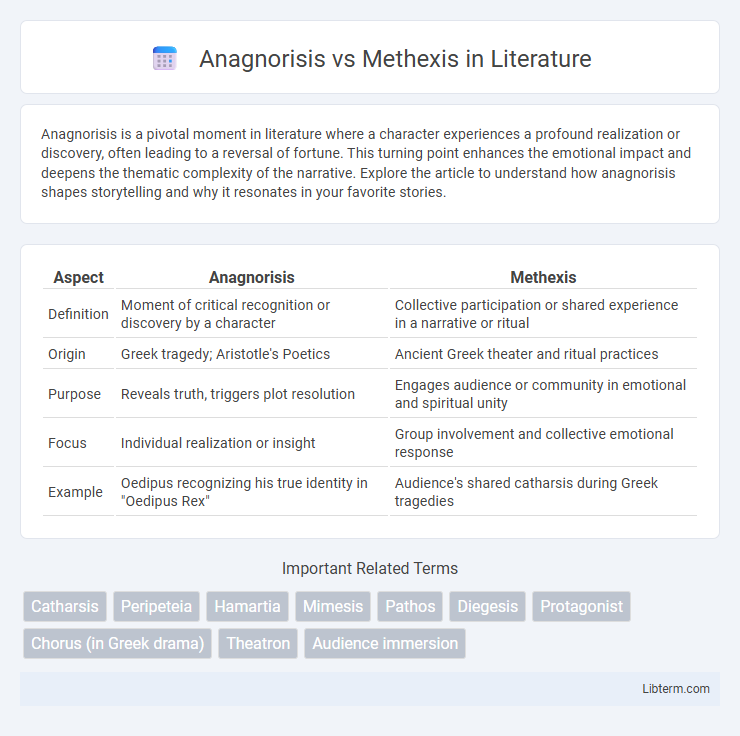Anagnorisis is a pivotal moment in literature where a character experiences a profound realization or discovery, often leading to a reversal of fortune. This turning point enhances the emotional impact and deepens the thematic complexity of the narrative. Explore the article to understand how anagnorisis shapes storytelling and why it resonates in your favorite stories.
Table of Comparison
| Aspect | Anagnorisis | Methexis |
|---|---|---|
| Definition | Moment of critical recognition or discovery by a character | Collective participation or shared experience in a narrative or ritual |
| Origin | Greek tragedy; Aristotle's Poetics | Ancient Greek theater and ritual practices |
| Purpose | Reveals truth, triggers plot resolution | Engages audience or community in emotional and spiritual unity |
| Focus | Individual realization or insight | Group involvement and collective emotional response |
| Example | Oedipus recognizing his true identity in "Oedipus Rex" | Audience's shared catharsis during Greek tragedies |
Understanding Anagnorisis: The Moment of Recognition
Anagnorisis represents the critical moment in a narrative when a character attains profound self-awareness or recognizes a previously unknown truth, dramatically altering the plot's trajectory. This moment of recognition often triggers catharsis, deepening emotional engagement and thematic resonance within Greek tragedy and classical storytelling. Unlike methexis, which emphasizes communal participation and shared experience, anagnorisis centers on individual transformation and revelation, highlighting personal insight as a pivotal turning point.
Defining Methexis: Collective Engagement in Drama
Methexis is a theatrical concept emphasizing collective engagement where the audience actively participates in the dramatic experience, blurring boundaries between performers and viewers. Unlike anagnorisis, which focuses on a character's critical moment of recognition or revelation, methexis fosters communal involvement, collective emotion, and shared transformation within the performance space. This participatory dynamic enhances the potency of drama by creating a unified experience that transcends passive observation and cultivates a sense of collective consciousness.
Historical Origins of Anagnorisis and Methexis
Anagnorisis, originating in classical Greek tragedy, refers to the critical moment of recognition or revelation experienced by a protagonist, as defined by Aristotle in "Poetics." Methexis, rooted in ancient Greek philosophy and drama, especially in Aristotle's concepts of catharsis and communal participation, emphasizes collective engagement and shared emotional experiences in theatrical performances. Historical origins of anagnorisis highlight its role in plot development and character transformation, while methexis underscores the social and participatory aspects of ancient Greek theater.
Anagnorisis in Classical Tragedy
Anagnorisis in classical tragedy signifies the moment when the protagonist attains critical self-awareness or recognizes a hidden truth that crucially alters their understanding of their situation, often leading to the climax. This revelation is pivotal to the structure of Greek tragedies, highlighting themes of fate, identity, and moral consequences. Unlike methexis, which emphasizes audience participation and communal experience, anagnorisis centers on the individual character's profound insight that propels the narrative toward its resolution.
Methexis in Ancient and Modern Performance
Methexis in Ancient Greek theatre involved the active participation of the audience, blurring the line between spectators and performers to create a communal experience central to religious and civic rituals. Modern performance adapts methexis by encouraging interactive and immersive experiences, engaging audiences through direct involvement or digital technology to transform passive viewing into dynamic participation. This shift enhances emotional connection and collective meaning-making, contrasting with anagnorisis, which centers on individual recognition and insight within the narrative.
Psychological Impact: Individual vs Collective Experience
Anagnorisis triggers a profound psychological impact by facilitating an individual's sudden realization or self-awareness, leading to intense personal transformation and emotional clarity. Methexis emphasizes a collective psychological experience, where shared rituals or performances foster communal empathy and unity, dissolving individual boundaries within the group. The contrast lies in anagnorisis promoting internal, introspective change, while methexis cultivates external, participatory emotional engagement among multiple individuals.
Literary Functions of Anagnorisis and Methexis
Anagnorisis functions as a critical moment of recognition or revelation in literature, triggering a protagonist's profound understanding that often leads to a pivotal shift in the narrative or character development. Methexis, in contrast, operates as an immersive experience where the audience or readers participate emotionally and intellectually, fostering communal engagement and shared meaning. Both literary devices deepen thematic expression, with anagnorisis driving plot transformation and methexis enhancing collective empathy and interpretation.
Examples of Anagnorisis in Literature and Theatre
Anagnorisis, a critical moment of recognition or discovery in literature and theatre, is exemplified in Sophocles' *Oedipus Rex*, where Oedipus realizes his tragic identity and past actions. Shakespeare's *King Lear* portrays anagnorisis through Lear's awakening to his folly and the true nature of his daughters, deepening the play's emotional impact. These moments of anagnorisis drive plot development and character growth by revealing hidden truths that alter the course of the narrative.
Methexis in Ritual and Participatory Drama
Methexis in ritual and participatory drama involves active communal engagement where participants collectively experience and enact the unfolding narrative, fostering a shared transformational process. This mode contrasts with anagnorisis, which centers on an individual's moment of critical recognition, as methexis emphasizes group involvement and immersion in symbolic actions that reinforce social cohesion and cultural meanings. Ritual methexis facilitates deeper emotional and spiritual connections through repeated, embodied enactments that transcend passive observation.
Comparing the Significance: Anagnorisis vs Methexis
Anagnorisis signifies a pivotal moment of recognition or discovery in a narrative, often leading to a profound transformation in the character's understanding or fate, crucial in classical tragedy for advancing the plot and evoking catharsis. Methexis, on the other hand, involves collective participation or shared experience, emphasizing audience engagement and communal catharsis in theatrical performance, particularly in ancient Greek drama. Comparing their significance reveals that anagnorisis drives individual character development and plot resolution, while methexis fosters social cohesion and emotional resonance between performers and spectators.
Anagnorisis Infographic

 libterm.com
libterm.com